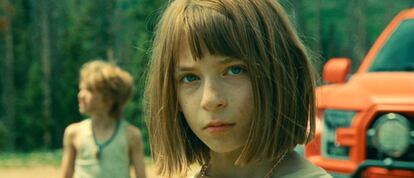The ‘Goonies’ 2.0 vs. the parental-control PIN
Weston Razooli’s ‘Riddle of Fire,’ which coincides in Cannes with entries by Wes Anderson and Michel Gondry, opens up new horizons for indie cinema


At the Cannes Film Festival, the kids at the center of Riddle of Fire have been dubbed the Goonies, in reference to the classic 1985 adventure movie. However, Riddle of Fire, an American indie film shot on 16mm by the debutant Weston Razooli, has its own personality and very little in the way of nostalgia. It all begins when three friends — Hazel, Alice and Jodie — steal a video game, only to come up against their worst enemy: the parental-control PIN. This launches them into an adventure featuring a blueberry pie, a dozen speckled eggs, a gang of criminals, and the daughter of one of its members: Petal, a girl blessed with magical powers and a way with words.
A movie that has been a mini-sensation in Cannes, Riddle of Fire’s appearance at the festival coincides with entries by Wes Anderson and Michel Gondry, two members of indie royalty whose youthful universes are now starting to sprout gray hairs. In Anderson’s entertaining movie Asteroid City, which is in the official selection of contenders for the Palme d’Or, the aesthetic hallmark of the director’s films continues to stand the test of time, thanks to a backdrop that idealizes 1950s America, that period of naïve suburban prosperity in which the forces of consumerism began to unfurl their tentacles. Anderson’s new visual fantasy is dominated by a pallet of turquoise, beige and coral blues that hog the spotlight. It doesn’t matter how stellar the cast is, or how absurd the storyline is; everything is engulfed by the movie’s aesthetic.
In The Book of Solutions, which is alongside Riddle of Fire in Cannes’ Directors’ Fortnight section, Gondry returns from an eight-year hiatus to join the growing trend among filmmakers for autofiction (following in the footsteps of movies like Víctor Erice’s Close Your Eyes and Nanni Moretti’s A Brighter Tomorrow). The Book of Solutions tells the story of a bipolar, paranoid director who must confront a harsh reality: the people paying for his film are going to take control of the project away from him, because the movie is incomprehensible. Accompanied by his film editor, the director runs away to his aunt’s house in the country, where he faces up to his creative difficulties.
While The Book of Solutions is a love letter to cinema, Riddle of Fire is a love letter to life. Although the central characters set off on an adventure on their bicycles, we’re not talking about a calculated 80s-nostalgia rehash in the mold of Stranger Things. Yes, you hear the 70s song Baby Come Back by Player, but the film’s emotions are new, fresh. Its revamped fantasies lead to a kind of pop magical realism in which witches, fairies and toy guns evoke a childhood in which Hansel and Gretel co-exist with the PlayStation. Together with the Spanish film Robot Dreams, an animated delight by Pablo Berger that’s part of Cannes’ Special Screenings section, Riddle of Fire is proof that alternative family films capable of opening up new horizons can be made.
Sign up for our weekly newsletter to get more English-language news coverage from EL PAÍS USA Edition
Tu suscripción se está usando en otro dispositivo
¿Quieres añadir otro usuario a tu suscripción?
Si continúas leyendo en este dispositivo, no se podrá leer en el otro.
FlechaTu suscripción se está usando en otro dispositivo y solo puedes acceder a EL PAÍS desde un dispositivo a la vez.
Si quieres compartir tu cuenta, cambia tu suscripción a la modalidad Premium, así podrás añadir otro usuario. Cada uno accederá con su propia cuenta de email, lo que os permitirá personalizar vuestra experiencia en EL PAÍS.
¿Tienes una suscripción de empresa? Accede aquí para contratar más cuentas.
En el caso de no saber quién está usando tu cuenta, te recomendamos cambiar tu contraseña aquí.
Si decides continuar compartiendo tu cuenta, este mensaje se mostrará en tu dispositivo y en el de la otra persona que está usando tu cuenta de forma indefinida, afectando a tu experiencia de lectura. Puedes consultar aquí los términos y condiciones de la suscripción digital.








































